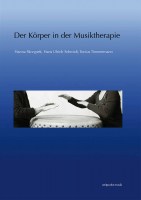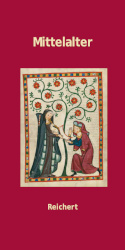Search
Skrzypek, Hanna; Schmidt, Hans Ulrich; Timmermann, Tonius
Der Körper in der Musiktherapie
Short Description
No english description available. Showing german description:Die tiefen Bezüge zwischen der Musiktherapie und der therapeutischen Arbeit mit dem Körper sind historisch verbürgt. Im praxeologischen Teil geht es um theoretische Ansätze und um die Umsetzung von Körperlichkeit in konkrete musiktherapeutische Vorgehensweisen. Die Problematik des körperlichen Kontakts in der Psychotherapie generell sowie in verschiedenen Arbeitsbereichen der Musiktherapie wird näher erörtert und soll zur Reflektion darüber anregen, wie der Umgang mit dem Körper noch besser in musiktherapeutische Ausbildungen integriert werden kann.
Description
No english description available. Showing german descriptionDer Körper ist das primäre Instrument in der Musiktherapie. Aus ihm, mit ihm und durch ihn entstehen alle Ausdrucksformen stimmlicher und instrumentaler Art. Musik entsteht im und durch den Körper, der sie hervorbringt und ausdrückt - sie wirkt wiederum auf den Körper, bewirkt physiologische, vor allem auch emotionale Reaktionen und lässt den Körper in Bewegung kommen. Die Lebensgeschichte eines Menschen ist in seinem Körpergedächnis gespeichert und kann im musiktherapeutischen Erleben im Bewusstsein auftauchen. Akustische Erfahrungen gehören neben taktilen neurobiologisch zu den frühesten.
Im genealogischen Teil dieses Buches wird erörtert, welche tiefen Bezüge zwischen der Musiktherapie und der therapeutischen Arbeit mit dem Körper historisch verbürgt sind. Im praxeologischen Teil geht es um aktuelle methodologische und theoretische Ansätze und um die Umsetzung von Körperlichkeit in konkrete musiktherapeutische Vorgehensweisen. Diese können körperliche Berührung einbeziehen oder auch nicht. Musik kann natürlich stets auch berühren, ohne dass eine konkrete körperliche Berührung notwendig ist. Das ist eine Stärke musiktherapeutischer Behandlung z. B. von Kindern, Patienten mit psychosomatischen Erkrankungen oder in der Geriatrie.
Die Problematik des körperlichen Kontakts in der Psychotherapie generell wird näher erörtert. Der unreflektierte Umgang mit dem Körper, insbesondere in Form jeglicher körperlicher Berührung, kann durchaus eine Gefahr darstellen bzw. zu manifesten Behandlungsfehlern führen, auch dann, wenn es sich nicht um einen sexuell intendierten/sexualisierten Körperkontakt handelt. In manchen Bereichen wiederum funktioniert Psychotherapie aber auch gar nicht ohne spontane oder gezielte Berührung. Ein gutes Beispiel stellen hier Kinder oder Patienten in der neurologischen Rehabilitation dar. Auch darauf soll in diesem Buch Bezug genommen werden. In bestimmten Fällen wiederum wäre möglicherweise eine zuwendende Körperberührung auch in einem primär verbal angelegten Verfahren hilfreich, wird aber in aller Regel konsequent vermieden. In der reichhaltigen Literatur zu den verbalen Psychotherapieverfahren wird die Beschäftigung mit diesem Thema weitgehend ausgeklammert.
Vielleicht kann das vorliegende Buch dazu beitragen, dass all dies mehr in die Diskussion kommt: Wie kann man den Umgang mit dem Körper noch besser in – nicht nur - musiktherapeutische Ausbildungen integrieren?
Biographical Note
Tonius Timmermann, Prof. Dr. rer. biol. hum.Studium der Pädagogik in Münster (1. Staatsexamen, Diplom); Musikpädagoge im Schuldienst; Ausbildung zum Musiktherapeuten an der Hochschule für Musik und darstellende Kunst und der Universität Wien, klinische Tätigkeit an der Universitätsnervenklinik München, und der Klinik St. Irmingard in Prien am Chiemsee (Abteilung Psychotherapie u. Psychosomatik); Promotion zum Dr.rer.biol.hum an der Universität Ulm (Abteilung Psychotherapie); seit 2003 Professor für Musiktherapie; Leitung des berufsbegleitenden Masterstudiengangs und der Forschungsstelle Musik und Gesundheit am Leopold-Mozart-Zentrum der Universität Augsburg; zahlreiche Publikationen in Form von Büchern und Fachartikeln; freie Praxis in München und Wessobrunn. (www.timmermann-domain.de)
Prof. Dr. Hans Ulrich Schmidt
Studium der Klavierpädagogik (Hochschule für Musik und Theater Hamburg); Gasthörerstudium der Musiktherapie in Hamburg und Wien; Studium der Humanmedizin an der Universität Hamburg; Promotion zum Dr. med. über ein musiktherapeutisches Thema; Zusatzbezeichnung „Psychotherapie“, „Facharzt für Psychotherapeutische Medizin“ , Gruppenpsychotherapeut. Supervisionstätigkeit. W2-Professur als Stellvertretender Studiengangsleiter des Augsburger Masterstudienganges Musiktherapie am Leopold-Mozart-Zentrum der Universität Augsburg. Dozent und Supervisor am Masterstudiengang Musiktherapie der Hochschule für Musik und Theater Hamburg. Ärztlicher Psychotherapeut am Ambulanzzentrum und an der Poliklinik für Psychosomatik und Psychotherapie des Universitätsklinikums Hamburg-Eppendorf. Langjährige Dozententätigkeit in verschiedenen Segmenten der medizinischen und psychotherapeutischen Lehre. Weiterbildungsbefugnis für das Gebiet Psychotherapeutische Medizin resp. Psychosomatische Medizin und Psychotherapie, bezogen auf die Durchführung ambulanter tiefenpsychologischer Psychotherapie. Berufsbegleitende Weiterbildungsbefugnis im Gebiet Psychotherapeutische Medizin , bezogen auf die Vermittlung der Supervision von Behandlungen. Psychotherapeutische Forschung mit Schwerpunkt Musiktherapie; Zahlreiche Veröffentlichungen zu musiktherapeutischen Themen. Schwerpunkte: Musik in der Medizin und Psychotherapie; Forschungsvernetzung. Wissenschaftlicher Beirat und Mitglied der Fortbildungskommission der DMtG. www.hu-schmidt-psychotherapie.de




 Preface
Preface

 Neuerscheinungen 2023/2024
Neuerscheinungen 2023/2024
 Gesamtverzeichnis 2023/2024
Gesamtverzeichnis 2023/2024
 Katalog Oriental Studies & Linguistics
Katalog Oriental Studies & Linguistics
 Mittelalter
Mittelalter
 Deutsche Inschriften
Deutsche Inschriften
 Musiktherapie
Musiktherapie
 Literaturen im Kontext
Literaturen im Kontext